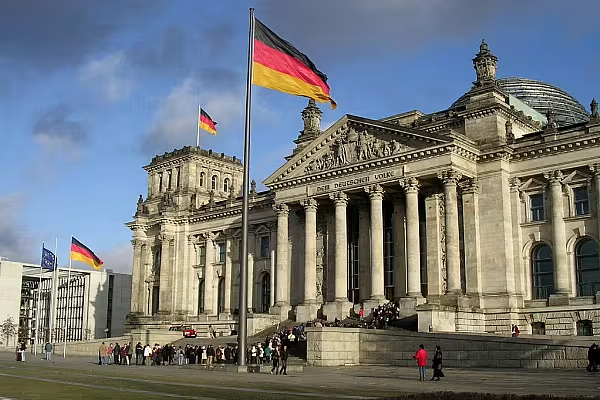The German economy extended its growth spurt in the second quarter, playing into the hands of Angela Merkel as she bids for a fourth term as chancellor.
Gross domestic product in Europe’s largest economy rose by 0.6 percent in the April-June period. While that’s below the 0.7 percent estimate in a Bloomberg survey of economists, the Federal Statistics Office revised first-quarter output up to 0.7 percent.
The euro extended its decline after the report and traded at $1.1756 at 8:32 a.m. Frankfurt time, down 0.2 percent.
Final Stretch
The report comes as Germany enters the final stretch of campaigning ahead of a Sept. 24 election, with opinion polls showing Merkel leading her Social Democratic challenger Martin Schulz by as much as 17 points. Her Christian Democratic Union-led bloc is benefiting from solid economic growth -- bolstered by a pickup in consumer spending thanks to receding joblessness and an increase in investment.
Germany has seen “several years of pretty strong economic performance,” Jack Allen, a European economist at Capital Economics in London, said before the report.“The unemployment rate is very low, the economy has done very well particularly by the euro-zone standards, so it’s quite possible that it will boost support for the incumbent party.”
In the second quarter, growth was driven by domestic demand, the statistics office said. Consumers and the government significantly stepped up spending. Investment in equipment and construction also increased from the previous three months. Trade damped economic output as imports rose considerably faster than exports, according to the report.
The economy expanded 2.1 percent from a year earlier. when adjusted for working days.
Optimism Confirmed
The numbers vindicate the optimism expressed by the Bundesbank last month, when it said the economy probably grew robustly in the second quarter. While Ifo’s business climate index jumped for a sixth month in July, suggesting prospects remain favorable, a purchasing managers’ index signaled that growth may be leveling off as companies hit capacity constraints and a stronger currency begins to bite.
The euro has appreciated some 12 percent this year against the dollar and more than 18 percent in trade-weighted terms.
“Exchange-rate swings are not going to have the same effect as on, say, Spanish exports, but we are still going to see some impact,” Florian Hense, an economist at Berenberg Bank in London, said before the report. “If you look at the PMI as the first leading indicator it signals that some sort of plateau has been reached.”
News by Bloomberg, additional reporting by ESM. Click subscribe to sign up to ESM: The European Supermarket Magazine.














